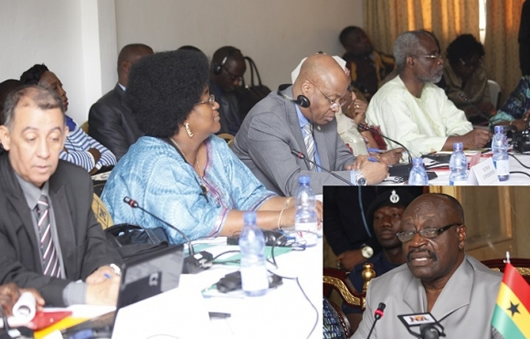
Dr Kwaku Agyemang Mensah (inset), Minister of Health, giving his speech at the ECOWAS meeting on ebola at the Miklin Hotel at Accra.
West African leaders are meeting in Accra today to strengthen sub-regional interventions to contain the Ebola Virus disease.
The two-day meeting, being chaired by President John Dramani Mahama, is also expected to consider recommendations such as non-closure of borders and restriction of mass travels in the sub-region.
Ahead of the summit, health ministers from Ebola affected countries in the sub-region met in Accra yesterday to fine tune recommendations on Ebola which will be considered by the leaders at the summit.
Organised by the West African Health Organisation (WAHO), the meeting also brought together health experts, development partners and a technical team from ECOWAS, and is expected to present a Memorandum of Understanding (MoU) to the ECOWAS Heads of State, imploring them to make additional financial contribution towards the fight against Ebola.
Addressing the opening session of the health ministers’ meeting, the Director General of WAHO, Dr Xavier Crespin, called on the international community to increase its financial and technical support to Ebola affected countries towards the fight against the disease.
So far, he said, the organisation had received a total of $4.5 million assistance, adding that the amount was not enough and called for more financial and logistical support.
Ghana’s Minister of Health, Dr Kwaku Agyemang-Mensah, in a welcoming address, said the crisis had evolved into a complex emergency, leading to a breakdown in the social and economic conditions in the affected countries.
He expressed optimism that with support from member countries and international partners, the disease could be contained in the sub-region, and indeed the global community, sooner than later.
Stakeholder involvement
The ECOWAS Commissioner for Social Affairs and Gender, Ms Fatimatu Dia Sow, said there was the need for a multi-dimensional approach and stakeholder involvement in stemming the spread of the disease.
The Deputy Director General of the World Health Organisation (WHO), Dr Anarfi Asamoah-Baah, called for the strengthening of structures for combating the virus.
He said by January 2015, a total of 250,000 doses of the Ebola vaccine would be released with an additional two million by the middle of next year.
However, he noted that the vaccine would not be enough and, therefore, underscored the need for the ECOWAS Heads of State to put in place measures that would ensure that the vaccines were distributed to places where they were needed.
He also called on the producers of the vaccine and the international community to ensure that it was affordable, particularly by people in areas affected by the disease.
Need to stop further spread
In a presentation on the ‘Epidemiological situation of the Ebola Disease’ in the affected countries, Mr Tome Ca, WAHO Health Information Manager, warned that cases of Ebola would escalate to over 20,000 in West Africa, if drastic measures were not put in place to halt its spread.
According to him, cases of the disease doubled within one month in the three most affected countries.
He said transmission of the disease continued to be intense in Liberia and Sierra Leone, while Guinea, where the case was first reported, had recorded some improvement in its efforts to contain the disease.
Source: Daily Graphic























